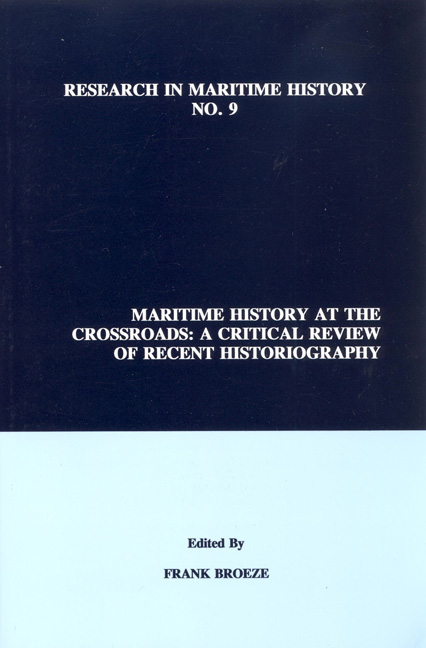Book contents
- Frontmatter
- Contents
- About the Editor
- Introduction
- Contributors
- “Maritime History in Australia”
- “The Enterprising Canadians: An Assessment of Canadian Maritime History since 1975”
- “The Historiography of Maritime China since c. 1975”
- “Danish Maritime History, 1976-1992: A Review”
- “German Maritime Historical Research since 1970: A Critical Survey”
- “The Maritime Historiography of Greece in Recent Decades”
- “Ibero-American Maritime History: Recent Advances in Research, 1975-1994”
- “Indian Maritime Historiography: West Coast Merchants in a Globalizing Economy”
- “Recent Developments in the Historiography of Maritime History in the Netherlands”
- “The Ottoman Empire: Recent Research on Shipping and Shipbuilding in the Sixteenth to Nineteenth Centuries”
- “The Progress of Maritime History in Spain since 1975”
- “Oceanic Historiography: The American Dimension”
“Ibero-American Maritime History: Recent Advances in Research, 1975-1994”
from Contributors
- Frontmatter
- Contents
- About the Editor
- Introduction
- Contributors
- “Maritime History in Australia”
- “The Enterprising Canadians: An Assessment of Canadian Maritime History since 1975”
- “The Historiography of Maritime China since c. 1975”
- “Danish Maritime History, 1976-1992: A Review”
- “German Maritime Historical Research since 1970: A Critical Survey”
- “The Maritime Historiography of Greece in Recent Decades”
- “Ibero-American Maritime History: Recent Advances in Research, 1975-1994”
- “Indian Maritime Historiography: West Coast Merchants in a Globalizing Economy”
- “Recent Developments in the Historiography of Maritime History in the Netherlands”
- “The Ottoman Empire: Recent Research on Shipping and Shipbuilding in the Sixteenth to Nineteenth Centuries”
- “The Progress of Maritime History in Spain since 1975”
- “Oceanic Historiography: The American Dimension”
Summary
Any review of maritime history as a whole will always be complex due to the nature of the discipline, but this difficulty is considerably increased when we try to embrace the variety of the Ibero-American community, which includes Spain, Portugal and all those American countries in which the influence of the Iberian nations, in interaction with indigenous society, has created a common cultural, religious and historical base. Since this historiographie review focuses only on the American part of this community, it should be easy to accept its usual denomination, i.e. Latin America, even if the region also contains some countries of non-Iberian origin. When the colonies of Spain and Portugal achieved independence, the frontiers of the new states were fixed largely according to the boundaries of viceroyalties or other existing political units. Maritime history in Latin America can be divided into three distinct phases: native, colonial and independent. Within these each country had its own specific historical moments and priorities.
During the first of these phases, the sea played an important role in several parts of Latin America, especially in the Caribbean, Central America and the Andean region. In the former area, the early extinction of the Tainos and other Caribbean native groups has left little evidence on early maritime activities. In the other two areas, Central America and the Andes, not only were these activities well recorded by early chroniclers but also some, despite the European conquest, have lasted to the present.
The arrival of the Europeans suddenly moved America out of its continental isolation and into a new global maritime history by incorporating substantial parts of the New World under the dominion of Spain and Portugal. The possession and control achieved by these powers relied heavily on their considerable maritime development which enabled them to explore and discover new islands and territories, to establish new trade routes under naval protection, to create ports and shipyards where new maritime communities developed, to exploit new fishing grounds, and to become involved in other maritime activities.
Independence in the early nineteenth century brought substantial changes in maritime activity, as each republic understandably tried to obtain the best part of its trade and shipping.
- Type
- Chapter
- Information
- Maritime History at the CrossroadsA Critical Review of Recent Historiography, pp. 151 - 170Publisher: Liverpool University PressPrint publication year: 1995



